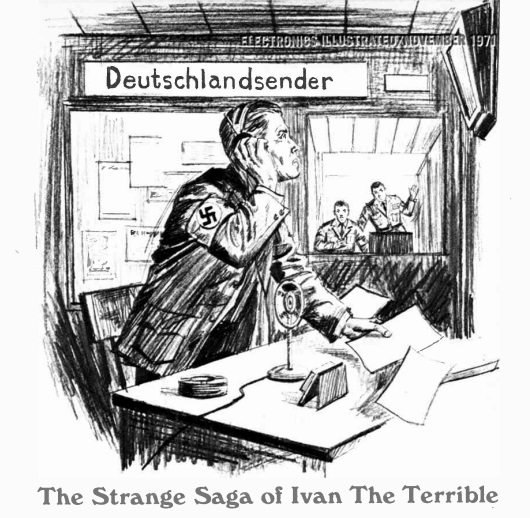 Fifty years ago this month, the November 1971 issue of Electronics Illustrated carried the story of Ivan The Terrible, the Soviet interloper who interfered with Nazi broadcasts during the war.
Fifty years ago this month, the November 1971 issue of Electronics Illustrated carried the story of Ivan The Terrible, the Soviet interloper who interfered with Nazi broadcasts during the war.
Deutschlandsender broadcast its German home service on 191 kHz, with broadcasts including the news. One day in 1941, listeners were able to hear additions to the news broadcast. For example, if the announcer said, “new victories have been won by the Wehrmacht,” another voice completed the sentence with “in the grave.”
The voices were coming from Soviet Station RW-1 at Noginsk, near Moscow. The engineers at that station were able to tune the 500 kW transmitter from its original frequency of 172 kHz and synchronize it with the German station to avoid any heterodyne. Eventually, the Germans were forced to put their news broadcasts on mediumwave, and use their powerful longwave transmitter for entertainment programs.
When the Russian source of the broadcasts was known, it was dubbed Ivan The Terrible, and that name is used in this 1941 Time magazine article from September 15, 1941.
According to the 1971 Electronics Illustrated article, British and American intelligence issued a report disclosing the identity of Ivan the Terrible. Unfortunately, however, the American copy of the report was misfiled and was lost somewhere in the Washington catacombs. The British copy was still covered by the Official Secrets Act and couldn’t be made public until 1991.
But the author of the article did enough digging to give “a pretty good idea” as to the identity. According to the 1971 article, the instigator was Sololmon Abraham Lozovsy.
Despite his service to the Soviet Union, Lozovsky became the victim of one of Stalin’s purges. Even though Krushchev later issued a pardon, it came a bit too late, since Lozovsky was shot in 1952.
The actual voice of Ivan The Terrible was that of Bohemian Ernst Fischer. After winding up on the wrong side of the Austrian civil war, he found his way to Moscow where his fluency in German was put to good use. After the war, Fischer brought his communism back to Austria, where he remained a figure in the Austrian Communist Party until 1969, serving as the Communist Minister of Information immediately after the war.
For a similar use of radio during the war, see our earlier post on Soldatensender Calais.
